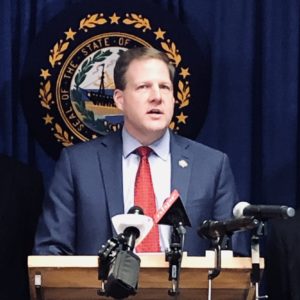At Friday’s COVID-19 presser, Gov. Chris Sununu told NHJournal the New Hampshire lockdown that’s left nearly 200,000 Granite Staters out of work might last “a couple more months.”
NHJournal asks the Republican governor what the rationale was for continuing the current business shutdown into the summer now that Sununu’s original benchmark — “flattening the curve” — has been met. (“Flattening the curve” refers to keeping the increase in COVID-19 hospitalizations below the state’s healthcare systems capacity to treat them.)
“I guess if you’re asking for the rationale for keeping the order in place, I would challenge you to tell me what’s the rationale for undoing the order?” Sununu responded.
“Because when you undo the order, you’re going to potentially create another surge. We put that order in place and had great success with it, given that we’re effectively a suburb of Boston,” Sununu said. “And while one death is too many, We’ve been able to keep our fatalities…at a relatively low level compared to our neighbor to the south.”
Instead of arguing that his lockdown is still “flattening the curve,” Sununu is now claiming that an extended shutdown is in the best interest of the state’s economy in the long run.
“We have to talk about the economics of six months, and a year, and two years down the road,” Sununu said. “And you do that by having discipline, by knowing that if you wait a couple more days, or a couple more weeks, or maybe even a couple more months, and you are smart about what you do, you put the entire state in a much healthier position economically in the long run.”
Earlier on Friday, the federal government released unemployment numbers that revealed the depth of the damage government-mandated business shutdowns are inflicting on the economy. Twenty million Americans lost their jobs in April alone due to executive orders from state governors shuttering their workplaces. These job losses sent the unemployment rate to a post-Depression record of 14.7 percent.
On a per-capita basis, New Hampshire is one of the hardest-hit states in the country, with 175,000 Granite Staters filing for unemployment in the past six weeks and an unemployment rate of more than 16 percent.
Jana, who works at a drug store in Derry, NH and didn’t give her last name, was visibly upset by the news of Sununu’s comments. “When did she say that? Why would he say that?” she asked. “People aren’t going to put up with this. This is going to get bad,” she told InsideSources.
“We have customers coming in all the time looking for things that we’re just not getting anymore. The supply chain is down. Look at what’s happening in grocery stores. You can’t get meat. Clorox says they won’t have wipes and cleaners until the summer. We’ve got to get people back to work.”
More than 5,700 people have signed a petition asking Sununu to reopen the state. However, polls from just a few weeks ago also show that a huge majority of Granite Staters supported more restrictions, not fewer.
Sununu pushed back against the ReOpenNH message.
“If you take away the stay-at-home order and just open everything up and throw all caution to the wind, we’re going to put ourselves in a very, very difficult situation. We would not be on this flattened curve for very long. So you have to have the discipline to stay with it,” Sununu said.
In fact, New Hampshire has never come close to a level of hospitalizations that would threaten the capacity of the state’s hospital system. As Sununu acknowledged at a previous COVID-19 press briefing, “We have multiple times available [hospital bed] capacity. You know, we could literally have 10 times — God forbid — 10 times the number of hospitalizations, and we could still very easily be able to handle that capacity.”
The state also has only a tiny percentage of hospitalizations and a handful of fatalities among healthy people under 60, a fact New Hampshire Department of Health and Human Services Commissioner Lori Shibinette confirmed during Friday’s presser. Asked about the high number of fatalities among the state’s nursing home residents (nearly 80 percent of all coronavirus deaths among less than 2 percent of the population), Shibinette responded: “Our death rate in the general population is so low that [death rate in LGCF] will look significant.”
To advocates for fewer COVID-19 restrictions, hospitals that are 90 percent below capacity and an insignificant number of fatalities in the general population sound like arguments against a lockdown, not a rationale to keep one in place.

